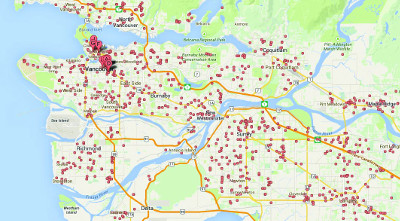 Belief in the importance of place has been growing over the past years. I have heard it referenced in an increasing number of conversations on both sides of the Atlantic. I have witnessed it at a book table at a recent conference. I have experienced it in my own life in the planting of a multi-neighbourhood church in Vancouver.
Belief in the importance of place has been growing over the past years. I have heard it referenced in an increasing number of conversations on both sides of the Atlantic. I have witnessed it at a book table at a recent conference. I have experienced it in my own life in the planting of a multi-neighbourhood church in Vancouver.
Ray Bakke recently commented that the missionary movement has moved from the “Nations to the Neighbourhoods.” Even in society, we see companies emphasizing place in advertising and in publishing. Place has been placed on our radar screens.
I am not convinced that this is a good thing as of yet.
Why? ‘Neighbourhood’ has become the latest bandwagon to jump on without knowing why or reflecting on the implications for life. It is a new strategy to replace the last one we had for growing the church. Where once we put our efforts into a long list of popular programs, we have now embraced the missional language and the neighbourhood emphasis . . . for the wrong reasons.
But wait, there is more. Others have seen the emphasis on neighbourhood as a way to practice a more social gospel (as if it can be reduced to that) at the expense of a verbal declaration of the good news of the present and coming reign of God.
This approach reflects what Charles Taylor (in A Secular Age) calls “exclusive humanism,” which is an ethical vision of human flourishing apart from God. Does this recent turn toward the neighbourhood reflect our own formation in the exclusive humanism of our secular age? I fear that far too many of the Christian conversations I am hearing seem to reflect a vision of flourishing apart from God; the gospel of Jesus Christ seems to have been left behind.
Scot McKnight addresses this concern head-on in his recent book The Kingdom Conspiracy. How long will it be before some get off of this bandwagon and on to the next?
But there are those who are stressing the importance of place for the right reasons.
Some are place-making and living in proximity because they believe it is a part of the incarnation – the nature and action of God. Others have recognized the love of God for the world and learned to participate in his mission in specific locations. Still others emphasize the witness of God’s people who are committed to building community as a reflection of God’s reconciling mission, and so they devote themselves to people in a particular place. In the end, any concern for place and living in proximity must draw upon and embody our understanding of God’s mission.
The importance and practice of place-making must originate in the being of God and in his action in the world. When the followers of Jesus recognize that Jesus has sent us into the very neighbourhoods where he is at work, we become a sign and foretaste of the reality of the presence of the kingdom of God.
This article re-posted with permission from The Missional Voice. Check out the rest of the newsletter here.
Cam Roxburgh is national director for Forge Canada, vice president of Missional Initiatives for the North American Baptists, and team leader at Southside Community Church. He lives in Surrey with his wife and four children. cam.roxburgh@forgecanada.ca
And for a really interesting local initiative, look at PlaceSpeak, “a location-based community consultation platform.”

